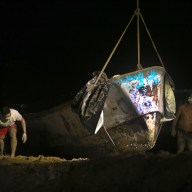In 2015 Kristen Stewart won the Cesar — basically the French Oscar — for Olivier Assayas’ “Clouds of Sils Maria,” a European drama where she played the personal assistant to a famous actress (played by Juliette Binoche). It worked out so well, the actress did it again. In “Personal Shopper,” she and Assayas reunite to make his version of a ghost movie — which is to say it’s not a horror film but a character study, and also a kind of documentary about Kristen Stewart. The actress plays a woman trying to connect with her recently late brother’s spirit. In between she ekes out a living in Paris picking up high-end clothes for a workaholic client. We talked to the acclaimed French filmmaker, of movies like “Irma Vep,” “Carlos” and “Summer Hours,” about working around paparazzi, avoiding Hollywood and his definition of “ghosts.” Kristen Stewart attracts a lot of fans and paparazzi members. That wasn’t a problem when you made “Clouds of Sils Maria,” because you were in remote Switzerland. But in “Personal Shopper” you’re on the streets of Paris or in train stations. How did you handle shooting with those crowds around? But in terms of shooting at the stations, it wasn’t a problem. People just don’t imagine she would get on a train or be there. We would hide the camera and just put her in the crowd. We would have her wait for a train and she would go into the crowd and walk around on her own while we filmed her. It was kind of fun. And ultimately the difficulty we had was the kind of difficulty we would have with any similar shot in any similar film, even if we were making a film with an unknown. There’s almost a documentary quality to the film. Sometimes you’re simply following her around doing menial things, and the more traditional scenes have a looseness to them, too. RELATED: You’ve been underestimating Kristen Stewart — and why you need to stop I get the sense you’ve done that a lot — that you’re making films to watch as an actress works through the material, whether it’s Kristen or Connie Nielsen in “demonlover” or Maggie Cheung in “Clean” and “Irma Vep.” That’s a very different approach from the Hollywood style, which seems more like following a readymade blue print. You’ve been trying to get a film made — “Idol’s Eye,” a heist movie that right now is supposed to star Sylvester Stallone, Rachel Weisz and Robert Pattinson — in America. It’s not strictly a Hollywood movie, but are you making sure you retain that kind of freedom? In Europe, filmmaking is still seen as an art, whereas in Hollywood it’s mostly about commerce. You need to work with people who speak the same language, if you will. How did you first explain “Personal Shopper” to Kristen? In “Personal Shopper,” Kristen’s character spends a fair amount of time watching documentaries and videos on her phone. I was wondering: Do you do that? Are you comfortable watching movies on a device the size of your palm? RELATED:“Clouds of Sils Maria,” the film that should have earned Kristen Stewart her Oscar, is on Netflix Sound is, strangely, a part of the film watching experience we rarely pay attention to. Your films feature a lot of live sound recording. Do you still pay close attention to the sound design? I don’t personally believe in ghosts, at least in the materialistic sense that there are these spirits we can or cannot perceive as real. But I do like the idea of ghosts as an abstract concept — that we live amongst the memories of departed loved ones or those over centuries and centuries of history. I’ve always been convinced that on film you capture something more than whatever you think you’re filming. Film has a strange ability to capture some invisible dimension of the world. And there has always been some kind of ghost undercurrent in my films. I’ve been toying with the subject over my movies. I wanted to see [with “Personal Shopper”] if I could go one step further. It was really important to establish really early in the film that this is a movie that is happening in a world where there are actually doors between reality and the invisible. All of a sudden there’s this weird light that [Kristen’s character] does not see. That establishes that ultimately this film won’t be about if there are ghosts or not, but about whether she can connect with them. That to me was a much more interesting question.
When we were shooting on the streets, we ended up having a lot of fan photos on the Internet of Kristen on her bike. The paparazzi and fans, somehow they have their ways of knowing where she is. I don’t know how they do it, but they have their ways. I try not to think about it. But at some point it becomes annoying, because it’s in the way of Kristen’s concentration. All of a sudden she’s worried by this and that.
It was about documenting Kristen going through the emotions I have put in motion. Because she’s such an authentic actor. She needs to make everything feel real. In the film you see her building up these emotions. I’m kind of documenting that process.
Part of the filmmaking involves creating short circuits. You put actors in situations that they’ve never been before, or that you’ve never really witnessed yourself. You make movies just to see what happens if you put those elements together.
Yeah, but that’s not the filmmakers’ fault, that’s the system. What’s depressing is the Hollywood system is so much about control. And there’s nothing more boring than control. You’re so privileged to make movies. Making movies is fun. It’s a pleasure. And Hollywood is all about taking the pleasure out of it. [Laughs] It’s too serious. Making movies, even if you’re making a serious movie, is always like children playing. And in movies there is this exciting, collective purpose. You’re sharing something with a lot of people. You’re giving them the opportunity to a part of something bigger than them, bigger than all of us. There’s a real beauty there. That’s what filmmaking is about. And Hollywood kind of spoils that. Ultimately that’s the reason I’ve never [worked in Hollywood]. I’d certainly have a hard time adapting.
At this point it will happen or it won’t. I’m not sure. But I need to be in control. That’s what makes the movie difficult to happen. Because it’s expensive. It’s a bit too expensive. If it was in the lower range, it would be much easier to make. What I’ve never really understood about the difference between European and American filmmaking is that in American film culture, if you’re a director, you’re an employee. You’re an employee of the studio, of the producers, of whoever. But basically you’re an employee. The reason I started making films in the first place is I don’t want to be an employee. That’s just not me. It’s not how I function. Otherwise I’d be doing installation art and showing it in galleries. If I’m making movies, I want to make my movies. I mean, my movies are movies, I should say.
You have to explain what you’re doing, why you’re doing it. You have to sell yourself. That’s not me. I just don’t function like that.
You can only make a film if people don’t want easy answers. It’s a matter of trust. I can make a movie like this because there is a trust between Kristen and me. She trusts me, I trust her. And I’ve been making my films with the same crew, more or less, since I started. It’s shifted, it’s evolved, but we’re like a theater troupe — except theater troupes are actors. Here it’s a crew.
I didn’t describe it at all. I don’t do that. I just gave her the screenplay. I said, “Read it and tell me if you can make any sense of it.” [Laughs]
No, that’s not my thing. But like everybody I do watch YouTube videos on my phone. But you know what does help [watching movies on your phone]? The sound. Sound is so much a part of the immersive experience of filmmaking. If you’re watching a movie and you have your headset, it’s intimate. What makes kids watch films on their phones is actually the sound.
It’s a dimension of cinema that is terribly misunderstood, especially by critics. [Laughs] When you make movies you’re sensitive to how it goes in and out, how it mixes or doesn’t mix with the action. People are just focused on the images or they are less interested in the soundtrack of the film.
I’m extremely, extremely, extremely attached to live sound, to original voices. I don’t do dubbing. But it’s never completely realistic. Once you get into thinking about how the sound will function in a film, you realize how abstract filmmaking is. We think that we are filming reality or reproducing our experience of perception for the cinema, but we absolutely don’t. It’s an interpretation of reality. I think that’s where sound gets into the equation. That’s when you realize how abstract and how much of an interpretation of the world it is.
I’m more or less, I suppose, like you: I don’t believe in ghosts in the literal sense. Maybe I believe in ghosts if we agree that “ghosts” is a code word for something else — the fact that we have to deal with invisible presences within us and outside of us. We constantly have some sort of conversation with something that’s not exactly there.
Olivier Assayas on Kristen Stewart and avoiding paparazzi
Follow Matt Prigge on Twitter @mattprigge














